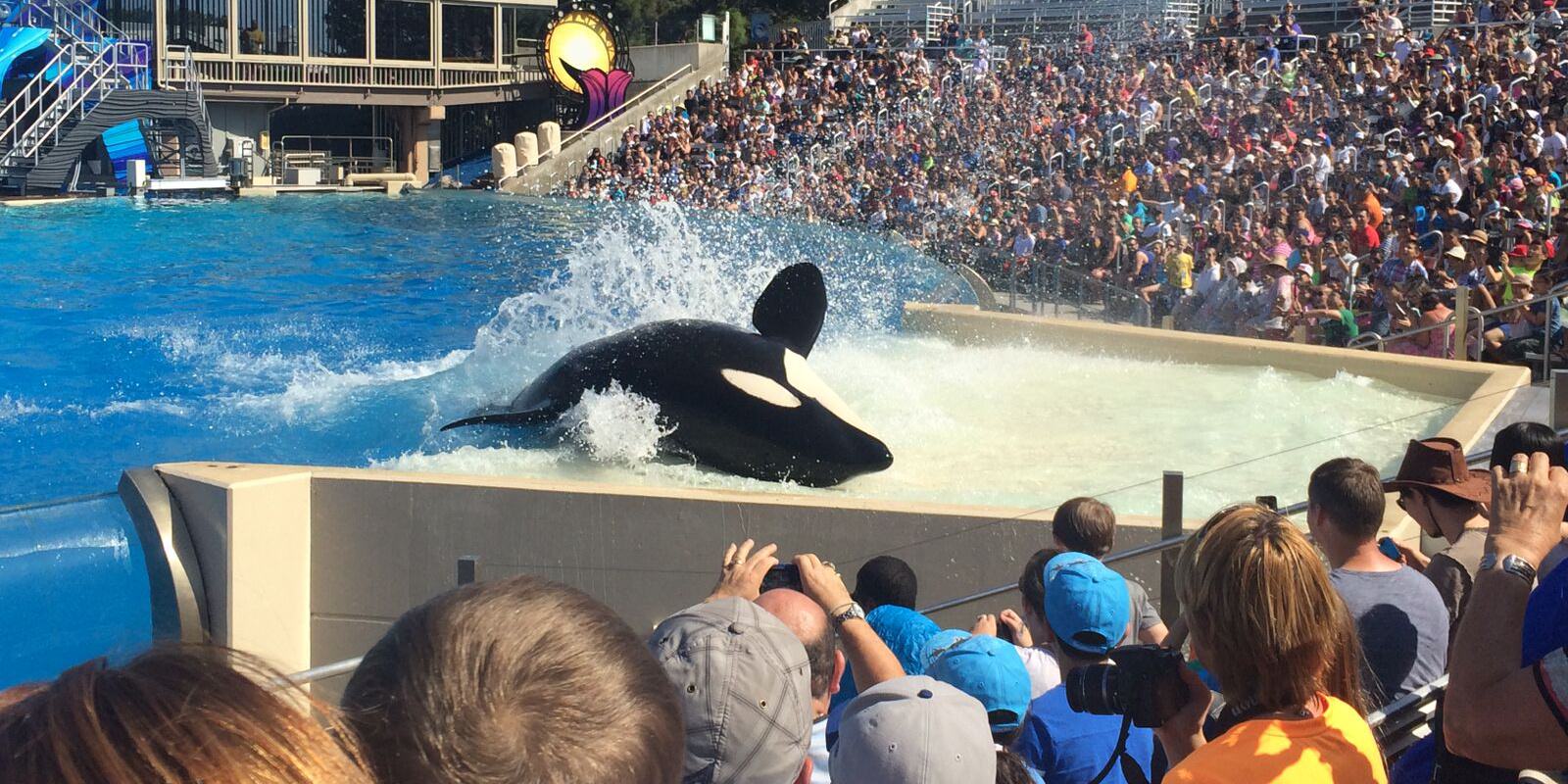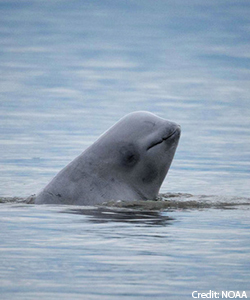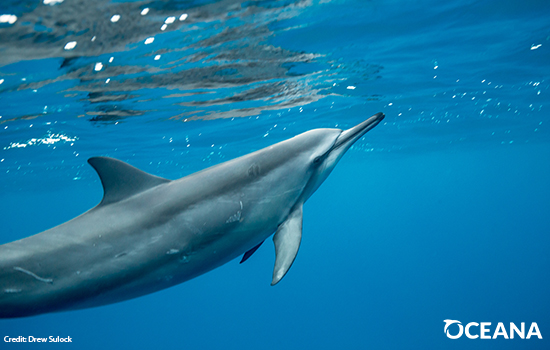A Whale Of A Week Photo of the Month, Educational Series: Oceanic Noise Pollution, SeaWorld Reportedly Fails Thomas Cook Animal-Welfare Audit, Whaling Season is Coming & Offshore Drilling in the Arctic
Urge Iceland to Ban Barbaric Whale Hunts Before it's too Late
If we don't take action now, around 200 whales could be murdered off of the coast of Iceland in a few short weeks.
An Icelandic whaling company called Hvalur, Inc, has announced the start of whaling season — and it's already nearly here!
On June 10th of this year, Hvalur will start hunting fin whales. The innocent mammals are harpooned, dragged in and then secured to the side of the ship. If they aren't already dead, they must endure an excruciating trip back to shore while injured, before they are finally butchered and sent off to Japan for consumption.
If Iceland were to outlaw whale hunting, companies like Hvalur and others wouldn't be able to get away with this slaughter. So let's make sure their government officials hear our message.
We have just a short amount of time left to raise our voices for whales. Iceland must ban the barbaric practice of whale hunting now.
Educational Series: Oceanic Noise Pollution
70 years ago, on July 26, 1946, the United States military set off a nuclear bomb underwater to test the effectiveness of their submarines to this kind of attack. The test went horribly wrong. The blast began as a giant hot bubble of gas that blew a 30 foot deep crater into the seafloor before exploding into the sky creating a column of water 5,000 feet high into the sky full of 2 million tons of radioactive water. The Bikini Atoll in the Pacific Ocean, where the explosion took place, is still considered uninhabitable for humans to this day, and while the plant and animal life there is abundant, there are reports of colonies of mutated sharks missing dorsal fins and coral the size of cars.
Even though the Partial Test Ban Treaty was passed in 1963 banning the testing of nuclear bombs in the atmosphere, outer space and underwater, our oceans are still under constant attack. Whales, dolphins and all marine life around the world are suffering from dangerously high levels of non-biodegradable plastic pollution, oil spills, and acidification, but a less discussed source of suffering is from noise pollution. Whales and dolphins suffer greatly from these constant, unnatural, and blaring noises in our oceans. The noise from container ship traffic, ships that are often larger than aircraft carriers, is doubling every decade. But the deadly sources, noises that are proving to be even more harmful to marine life, are from sonic blasts used for oil and gas exploration and the deafening slow rolling sound waves from military sonar testing.
What are sonic blasts?
Oil and gas exploration companies use sonic blasts to find their best chances of extracting fossil fuels under the sea floor. They do this by setting off 30-40 air guns simultaneously about every 10 seconds for weeks or even months on end. Each time they set off a round of these sonic blasts, the noise, reaching levels as loud as 265 decibels, will travel thousands of miles through the ocean. In comparison, the loudest music concert you can find is only around 170 decibels loud.
Why does the military use sonar testing?
The military regularly scans the ocean for enemy submarines using slow rolling sound waves that reach levels of 235 decibels. These sounds waves can reach distances of up to 300 miles while still retaining an intensity level of 130 decibels. They also have frequent training exercises using their sonar technology, which are just as destructive and damaging as their regular scans.
How do these loud noises affect whales?
A whale’s eyesight is so poor it can barely see the end of its own tail. They rely almost entirely upon sound to communicate, find food and navigate through the water. They create a symphony of sounds to talk to other whales and to keep track of their own babies. Some of the most heavily trafficked cargo ship routes are common areas for whale migration and feeding grounds. And due to the increase in noise, whales are now losing up to 70% of their ability to communicate. They are having a harder time finding mates, keeping up with their own young and locating places to feed. When a whale finds a good feeding ground, he will tell all of the surrounding whales where to find the food through noise, but if the whales can’t hear him, there is a good chance they will not be able to find their food. If a whale goes deaf, it can no longer survive. In areas where sonic blasting and highly used shipping routes take place, the whale populations have shown dramatic decreases. When these noise blasts occur, whales are swimming hundreds of miles away and diving deeper into waters at such a fast pace that bleeding from their eyes and ears can occur. In 2005, 34 whales of varying species beached themselves on a coast off the Atlantic Ocean during nearby navy sonar training exercises. These whales are under constant attack from noise in an environment that no human would be able to withstand, but whales have nowhere else to go.
What can be done?
Technologies are advancing so that ships can now be built 1000 times more quiet, and a sweeping sound device called Vibroseis has been created to successfully aid in oil and gas exploration without the damaging sounds of the sonic blasts. The technology is there, but they aren’t being utilized on a broad scale, and that needs to change. Techniques such as the “ramp-up” technique is being tested to help get whales out of the deafening areas of the blasts, but, to date, it has not proven to be successful.
A lot of this noise pollution is green lighted through government contracts. We need to be vigilant, active, and vocal in our government. Let your representatives know that you stand against sonic blasts for oil and gas exploration and for military experiments. Non-profits such as the National Resources Defense Council (NRDC) and the International Fund for Animal Welfare (IFAW) have been fighting back and winning, pushing the military to use the ramp up method and to lessen the frequency in non-war times, citing the National Environmental Policy Act, Endangered Species Act, and the Marine Mammal Protection Act, but they can’t do it alone and they need our support.
Finally, support renewable resource industries such as wind and solar power. Contact your energy provider and request that your energy is supplied by 100% renewable energy. Reuse and recycle whenever you can to help keep our oceans clean, and limit your use of plastics, including microbeads in your health and beauty products. Whales, dolphins and all marine life are depending on us to help them survive.
And, as always, spread awareness to your friends and family so that we can all support animals and fight this together.

If we don't take action now, around 200 whales could be murdered off of the coast of Iceland in a few short weeks.
An Icelandic whaling company called Hvalur, Inc, has announced the start of whaling season — and it's already nearly here!
On June 10th of this year, Hvalur will start hunting fin whales. The innocent mammals are harpooned, dragged in and then secured to the side of the ship. If they aren't already dead, they must endure an excruciating trip back to shore while injured, before they are finally butchered and sent off to Japan for consumption.
If Iceland were to outlaw whale hunting, companies like Hvalur and others wouldn't be able to get away with this slaughter. So let's make sure their government officials hear our message.
We have just a short amount of time left to raise our voices for whales. Iceland must ban the barbaric practice of whale hunting now.
Educational Series: Oceanic Noise Pollution
70 years ago, on July 26, 1946, the United States military set off a nuclear bomb underwater to test the effectiveness of their submarines to this kind of attack. The test went horribly wrong. The blast began as a giant hot bubble of gas that blew a 30 foot deep crater into the seafloor before exploding into the sky creating a column of water 5,000 feet high into the sky full of 2 million tons of radioactive water. The Bikini Atoll in the Pacific Ocean, where the explosion took place, is still considered uninhabitable for humans to this day, and while the plant and animal life there is abundant, there are reports of colonies of mutated sharks missing dorsal fins and coral the size of cars.
Even though the Partial Test Ban Treaty was passed in 1963 banning the testing of nuclear bombs in the atmosphere, outer space and underwater, our oceans are still under constant attack. Whales, dolphins and all marine life around the world are suffering from dangerously high levels of non-biodegradable plastic pollution, oil spills, and acidification, but a less discussed source of suffering is from noise pollution. Whales and dolphins suffer greatly from these constant, unnatural, and blaring noises in our oceans. The noise from container ship traffic, ships that are often larger than aircraft carriers, is doubling every decade. But the deadly sources, noises that are proving to be even more harmful to marine life, are from sonic blasts used for oil and gas exploration and the deafening slow rolling sound waves from military sonar testing.
What are sonic blasts?
Oil and gas exploration companies use sonic blasts to find their best chances of extracting fossil fuels under the sea floor. They do this by setting off 30-40 air guns simultaneously about every 10 seconds for weeks or even months on end. Each time they set off a round of these sonic blasts, the noise, reaching levels as loud as 265 decibels, will travel thousands of miles through the ocean. In comparison, the loudest music concert you can find is only around 170 decibels loud.
Why does the military use sonar testing?
The military regularly scans the ocean for enemy submarines using slow rolling sound waves that reach levels of 235 decibels. These sounds waves can reach distances of up to 300 miles while still retaining an intensity level of 130 decibels. They also have frequent training exercises using their sonar technology, which are just as destructive and damaging as their regular scans.
How do these loud noises affect whales?
A whale’s eyesight is so poor it can barely see the end of its own tail. They rely almost entirely upon sound to communicate, find food and navigate through the water. They create a symphony of sounds to talk to other whales and to keep track of their own babies. Some of the most heavily trafficked cargo ship routes are common areas for whale migration and feeding grounds. And due to the increase in noise, whales are now losing up to 70% of their ability to communicate. They are having a harder time finding mates, keeping up with their own young and locating places to feed. When a whale finds a good feeding ground, he will tell all of the surrounding whales where to find the food through noise, but if the whales can’t hear him, there is a good chance they will not be able to find their food. If a whale goes deaf, it can no longer survive. In areas where sonic blasting and highly used shipping routes take place, the whale populations have shown dramatic decreases. When these noise blasts occur, whales are swimming hundreds of miles away and diving deeper into waters at such a fast pace that bleeding from their eyes and ears can occur. In 2005, 34 whales of varying species beached themselves on a coast off the Atlantic Ocean during nearby navy sonar training exercises. These whales are under constant attack from noise in an environment that no human would be able to withstand, but whales have nowhere else to go.
What can be done?
Technologies are advancing so that ships can now be built 1000 times more quiet, and a sweeping sound device called Vibroseis has been created to successfully aid in oil and gas exploration without the damaging sounds of the sonic blasts. The technology is there, but they aren’t being utilized on a broad scale, and that needs to change. Techniques such as the “ramp-up” technique is being tested to help get whales out of the deafening areas of the blasts, but, to date, it has not proven to be successful.
A lot of this noise pollution is green lighted through government contracts. We need to be vigilant, active, and vocal in our government. Let your representatives know that you stand against sonic blasts for oil and gas exploration and for military experiments. Non-profits such as the National Resources Defense Council (NRDC) and the International Fund for Animal Welfare (IFAW) have been fighting back and winning, pushing the military to use the ramp up method and to lessen the frequency in non-war times, citing the National Environmental Policy Act, Endangered Species Act, and the Marine Mammal Protection Act, but they can’t do it alone and they need our support.
Finally, support renewable resource industries such as wind and solar power. Contact your energy provider and request that your energy is supplied by 100% renewable energy. Reuse and recycle whenever you can to help keep our oceans clean, and limit your use of plastics, including microbeads in your health and beauty products. Whales, dolphins and all marine life are depending on us to help them survive.
And, as always, spread awareness to your friends and family so that we can all support animals and fight this together.

SeaWorld Reportedly Fails Thomas Cook Animal-Welfare Audit. The travel provider, which positions itself as a leader on animal welfare, has NO excuse to keep promoting SeaWorld. Read More!
|
Seismic airgun
blasting and offshore drilling would place beluga whales in unprecedented
danger. Yet Secretary Zinke and President Trump are working to allow
dangerous offshore drilling in the Arctic's Beaufort Sea. The deadline for you to comment was just extended to May 30. Don, it is critical that we take advantage of this opportunity. Add your name now to tell the Trump Administration: NO offshore drilling in the Arctic Ocean! |















